
Journal of Functional Biomaterials
metrics 2024
Exploring the Boundaries of Biomedical Engineering
Introduction
Journal of Functional Biomaterials is a prominent peer-reviewed journal dedicated to the innovation and application of biomaterials, covering vital fields such as biomedical engineering and materials science. Published by MDPI in Switzerland, this Open Access journal has been serving the academic community since 2010, allowing unrestricted access to groundbreaking research. With an impressive Q2 ranking in both Biomaterials and Biomedical Engineering for 2023, it stands as a significant contributor to the fields it represents. Researchers will find the journal's focus on functional biomaterials particularly relevant, as it encompasses a diverse range of studies aimed at enhancing the performance and applicability of biomaterials in medical contexts. The journal's commitment to disseminating high-quality research fosters collaboration and innovation among professionals, making it an essential resource for anyone involved in this dynamic area of study.
Metrics 2024
 -
- 5.00
5.00 5.50
5.50 -
-Metrics History
Rank 2024
IF (Web Of Science)
JCI (Web Of Science)
Quartile History
Similar Journals

BIO-MEDICAL MATERIALS AND ENGINEERING
Exploring the future of biomedical materials.BIO-MEDICAL MATERIALS AND ENGINEERING, published by IOS PRESS, serves as a vital platform for advancing the fields of biomaterials and biomedical engineering. With its ISSN 0959-2989 and E-ISSN 1878-3619, the journal has been consistently disseminating high-quality research since its inception in 1991, covering a diverse range of studies on the development and application of biomedical materials. Although currently classified in the Q4 quartile in several categories including biomaterials and biomedical engineering, the journal aims to appeal to a broad audience of researchers and professionals, fostering collaboration and innovation in translating new materials into clinical practice. Located in the Netherlands, it emphasizes the importance of interdisciplinary approaches and provides a forum for new ideas and findings that could significantly impact healthcare solutions. While not an open-access journal, it provides various access options to maximize the reach and engagement of its research. Researchers, practitioners, and students alike will find valuable insights and comprehensive studies within its pages, contributing to the continued evolution of biomedical sciences.

Biomedical Materials
Exploring the Intersection of Biology and Engineering.Biomedical Materials, published by IOP Publishing Ltd, is a premier journal dedicated to the rapidly evolving field of biomedical engineering and materials science. With a robust impact factor showcasing its influence, this journal serves as a vital platform for disseminating pioneering research from 2006 to 2024. Covering an array of interdisciplinary topics—ranging from biomaterials to bioengineering and applied chemistry—the journal consistently ranks in the second quartile across multiple categories including Bioengineering (Q2), Biomaterials (Q2), and Biomedical Engineering (Q2) as of 2023. Researchers, professionals, and students alike benefit from its contributions, exploring innovative solutions at the intersection of biology and material science. Although not an Open Access journal, Biomedical Materials remains essential in advancing our understanding and facilitating discussions surrounding state-of-the-art materials that revolutionize medical applications and enhance patient care.

Regenerative Biomaterials
Innovating Biomaterials for Tomorrow's MedicineRegenerative Biomaterials, published by Oxford University Press, serves as a premier platform for the dissemination of innovative research in the rapidly evolving field of biomaterials. Since its inception in 2014, this esteemed open-access journal has fostered a collaborative and diverse scientific community, providing free access to impactful articles that enhance our understanding of regenerative medicine and tissue engineering. With a commendable impact factor and ranking within the top quartiles of both Biomedical Engineering and Materials Science, it is recognized for its rigorous peer-review process and high-quality publications. The journal aims to bridge the gap between fundamental research and applied sciences, promoting advanced studies that contribute to clinical applications and regeneration strategies. Researchers, practitioners, and students alike are encouraged to engage with the journal’s content to foster interdisciplinary collaboration and drive future innovations in the biomaterials domain.
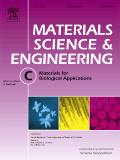
Materials Science & Engineering C-Materials for Biological Applications
Connecting materials science with biological advancements.Materials Science & Engineering C-Materials for Biological Applications is a premier journal published by ELSEVIER, dedicated to advancing the field of biomaterials through interdisciplinary research. With a robust ISSN of 0928-4931, this journal has made its mark in the realms of Chemical Engineering and Materials Science, achieving impressive Scopus rankings within its categories, namely Rank #16/151 in Bioengineering (89th percentile) and Rank #13/112 in Biomaterials (88th percentile). Although the journal's coverage in Scopus has been discontinued since 2021, it remains a critical resource for researchers, professionals, and students eager to explore innovative materials and their applications in biological contexts. The journal’s open access policy enhances its accessibility, fostering a global exchange of knowledge and inspiring future advancements in the field of materials science.
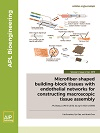
APL Bioengineering
Pioneering Solutions for Biomedical ChallengesAPL Bioengineering is a premier open-access journal published by AIP Publishing, dedicated to advancing the field of bioengineering and its interdisciplinary applications. Established in 2017, this journal serves as a vital platform for researchers, professionals, and students interested in the critical intersections of bioengineering, biomaterials, biomedical engineering, and biophysics. With an impressive impact factor and consistent rankings in the Q1 category across multiple domains, including biochemistry and materials science, APL Bioengineering has positioned itself among the top journals in its field. The journal aims to publish innovative original research, comprehensive reviews, and insightful case studies that further the understanding and application of bioengineering principles. Since its inception, APL Bioengineering has fostered a community of thought leaders, providing open access to ensure broad dissemination of knowledge and advancements that underpin the future of biomedical innovation.

Materials Today Bio
Bridging disciplines to transform biomedical engineering practices.Materials Today Bio, published by Elsevier, is an esteemed open-access journal dedicated to advancing the fields of bioengineering, biomaterials, and biomedical engineering. Since its inception in 2019, this journal has quickly made a name for itself, currently ranked Q1 in multiple categories including Bioengineering, Biomaterials, and Biotechnology, reflecting its exceptional quality and relevance in the rapidly evolving landscape of bio-related sciences. With an impressive Scopus ranking positioning it in the top 25% of its categories, Materials Today Bio provides a vital platform for researchers and professionals to share cutting-edge discoveries and innovative applications that bridge the gap between materials science and biological studies. Accessible to a global audience, this journal not only fosters collaboration among the scientific community but also aims to highlight significant advancements in cell and molecular biology, making it an indispensable resource for students and seasoned experts alike. The journal's commitment to open access since 2019 underscores its dedication to disseminating knowledge widely, ensuring that crucial findings reach those who can benefit from them the most.

JOURNAL OF BIOMEDICAL MATERIALS RESEARCH PART A
Transforming biomedical engineering with impactful discoveries.JOURNAL OF BIOMEDICAL MATERIALS RESEARCH PART A, published by WILEY, is a leading journal in the field of biomaterials and biomedical engineering, showcasing cutting-edge research that bridges the gap between material science and healthcare applications. With a robust 2023 impact factor reflecting its high-quality contributions, this journal is classified in the Q2 quartile for Biomaterials, Biomedical Engineering, and Ceramics and Composites, while achieving an impressive Q1 ranking in Metals and Alloys. The journal caters to a diverse readership, including researchers, professionals, and students, aiming to facilitate innovation and advancements in biocompatible materials and their applications in medical devices and tissue engineering. Access options for readers are available, ensuring the latest studies and findings are readily accessible to all stakeholders in this dynamic field. As it progresses towards its 2024 target, the JOURNAL OF BIOMEDICAL MATERIALS RESEARCH PART A continues to be an essential resource for anyone involved in the development and application of biomedical materials.
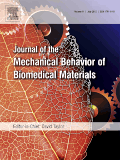
Journal of the Mechanical Behavior of Biomedical Materials
Innovating the Future of Healthcare Through Mechanical Behavior StudiesJournal of the Mechanical Behavior of Biomedical Materials is a leading academic publication dedicated to the intersection of mechanical engineering and biomedical innovation. Published by ELSEVIER in the Netherlands, this journal, which holds a solid presence within Q2 in Biomaterials and Biomedical Engineering, and Q1 in Mechanics of Materials as of 2023, features high-impact research with a measurable Scopus ranking that places it in the top tier of its fields. With an impressive percentile performance—82nd in Mechanics of Materials and 73rd in Biomedical Engineering—this journal serves as a vital resource for researchers, students, and professionals seeking to enrich their understanding of the mechanical behaviors of biomaterials and their applications. Spanning converged years from 2008 to 2024, it provides access to a wealth of pioneering research that advances the knowledge essential for the development of innovative biomedical applications. Engage with cutting-edge studies and broaden your expertise in the rapidly evolving realms of biomaterials and biomedical engineering through this authoritative publication.
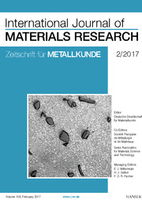
International Journal of Materials Research
Advancing the Frontiers of Materials ScienceInternational Journal of Materials Research is a prestigious academic platform specializing in the dissemination of cutting-edge research in the fields of materials science and condensed matter physics. Published by Walter de Gruyter GmbH, this journal serves as a vital resource for researchers, professionals, and students interested in the innovations shaping the materials landscape today. With an impact factor that reflects its growing influence, this journal offers an array of open access options, allowing for broad dissemination and accessibility of published findings. Spanning research from 1994 to 2024, the journal consistently ranks in the Q3 and Q4 quartiles across key subcategories, including materials chemistry, metals and alloys, and physical and theoretical chemistry. By bridging the gap between theoretical frameworks and practical applications, the International Journal of Materials Research provides an essential forum for advancing knowledge and fostering collaborations within the materials research community.
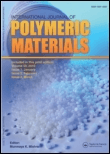
International Journal of Polymeric Materials and Polymeric Biomaterials
Pioneering Polymer Science for a Sustainable FutureThe International Journal of Polymeric Materials and Polymeric Biomaterials, published by Taylor & Francis AS, stands at the forefront of materials science, showcasing groundbreaking research in the fields of Analytical Chemistry, Chemical Engineering, and Polymeric Materials. With an ISSN of 0091-4037 and an E-ISSN of 1563-535X, this esteemed journal, established in 1971, serves as a vital platform for academics and professionals seeking to disseminate innovative findings and elevate the understanding of polymeric materials. Featuring a commendable impact factor and ranking in the top quartiles of its categories—Q2 in Analytical Chemistry, Chemical Engineering, and Polymers and Plastics—the journal is a pivotal resource for researchers aiming to leverage polymer science in various applications. Although it does not offer open access, its rigorous peer-review process ensures that only high-quality research is published, making it an essential reference for anyone involved in polymer research and development.